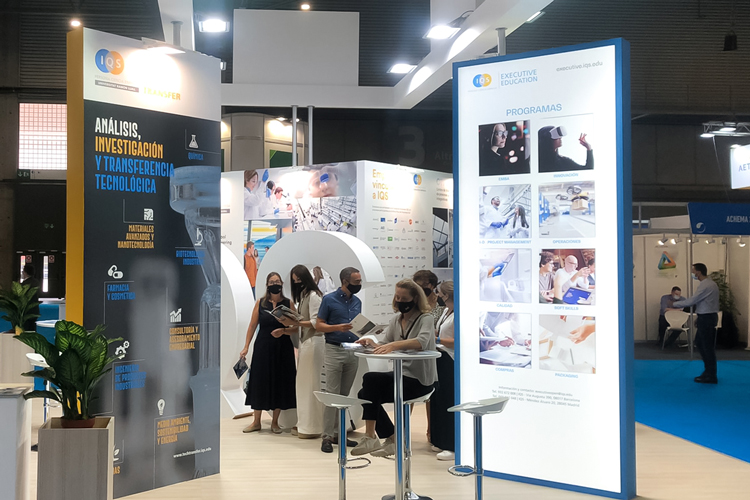IQS was present at the latest edition of Expoquimia that took place between 14 and 17 September at the Barcelona Fairgrounds.

Image of the IQS stand at Expoquimia
IQS was present at the latest edition of Expoquimia that took place between 14 and 17 September at the Barcelona Fairgrounds. For yet another year, IQS has maintained its commitment to this event as it has since the very beginning, seeking to be an active participant in this benchmark fair for the chemical sector. IQS took part in the event with a stand representing the university in addition to contributions from various professors and researchers in the sessions that were held live on site.
Although IQS intended to showcase its technology transfer and the services it offers to the industrial sector, not to mention its continuing education programmes, one of IQS's main objectives with its stand was simply being present at the event! IQS wanted to be present to continue sharing its knowledge and explain its activities to attendees: preparing professionals through IQS educational programmes, research activities, technology transfer, actions aimed at professionals, networking, and more. Above all, we wanted to be present to engage in personal contact with everyone who came to see us at our stand and talk, share impressions, offer attendees the chance to discuss their most recent professional experiences, and share the latest IQS news.
Among the activities that were held during the seminars and presentations that took place in the Workshop & Seminars Area and the Innovation & Tech Transfer Area, the following are worth highlighting:
Real-life mass spectrometry for laboratory applications
Dr Josep L. Lliberia and Dr Margalida Artigues, from the SCIEX-IQS Demo Lab, presented the possibilities and advantages of using combined GC-MS equipment, such as the QTOF mass spectrometer coupled to a liquid chromatography system in their laboratory. This combined technique makes it possible to separate different analytes that are present in complex mixtures through chromatographic techniques and to quantify their mass through MS using different ionization options and work modes. The most relevant applications of the LC-MS (QTOF) combination were also presented, both for small molecules (pharma, food, environment, clinical, etc.), as well as for large molecules (biotech, genomics, etc.).
ICP-MS in the day-to-day work of a multifunctional laboratory
Dr Ariadna Verdaguer, head of the IQS Metals Analysis Laboratory, gave a talk about the ICP-MS technique, an analysis technique that makes it possible to determine and quantify most chemical elements in very low concentrations, especially metals, an area in which this laboratory has significant experience. Dr Verdaguer spoke about the analytical technique and two of its applications – single particle, single cell – that facilitate expanding work in the field of biomedical sciences (how to determine the size of nanoparticles or the concentration of metal present in them, for example), the analysis of the distribution and characterization of microplastics in water, and many more applications.
From Biosciences to Society: Polymerase Chain Reaction (PCR) principles and applications
Dr Pau Leivar, with the IQS Department of Bioengineering, explained what the Polymerase Chain Reaction (PCR) consists of, a very important technique used in molecular biology that makes it possible to obtain a large number of concrete DNA fragments in vitro. This technique, created in the 1980s, produced a veritable revolution in molecular engineering and led to a significant impact on the biomedical and biotechnological sciences and a growing social impact due to its use in the ongoing coronavirus pandemic. Its applications are limitless and are carried out using next-generation sequencing (NGS) systems: for example, it has been possible to sequence the genome of a mammoth and a 5,300-year-old human. In addition, it is used to determine the Rh factor, to study genomic variation between different populations around the world, to identify genes that are susceptible to developing specific diseases (with vast relevance for personalized medicine), or for forensic analysis, among many others.
Lights4Lungs: Inhalable aerosol light source for controlling drug resistance
Dr Santi Nonell presented Light4Lungs (L4L), a European project coordinated by IQS within a consortium made up of leading universities, research centres, and specialized companies. L4L tackles the problem of antimicrobial resistance in the treatment of lung infections, a growing concern that threatens to be one of the major causes of mortality in the near future. The project uses photodynamic therapies to combat these infections through the use of small points of light – nanolights – that are activated within the lungs after being inhaled by a patient then activate the porphyrins of microorganisms without the need for any additional drugs. More information: https://light4lungs.eu/
KET4F-Gas: moving towards reducing greenhouse gases
Dr Felix Llovell presented the findings of KET4F-Gas, an interregional European project in which IQS participates along with other research centres in Southern Europe. With a duration of three years and entitled Reduction of the environmental impact of fluorinated gases in the SUDOE space, the objective of the project was to design and develop new essential facilitating technologies to capture and sequester commonly used gases such as fluorinated gases – which have a significant warming capacity – to facilitate their recovery and minimize their environmental impact, a clear solution aimed at the circular economy. The researchers involved in this project were able to design prototypes to carry out these recoveries within waste management companies themselves. More information: http://www.ket4f-gas.eu/?page_id=677&lang=es
Finally, it is worth highlighting the Expoquimia R&D&i award in chemical research 2020, which was won by the IQS spinoff Tractivus SL for their work Bacteriophobic coatings to prevent bacterial colonization in medical devices which was accepted by Dr Joan Gilabert and Dr Robert Teixidó on 16 September from the president emeritus of Expoquimia, Mr Rafael Foguet.
We look forward to seeing everyone again in 2023!
Dr Núria Vallmitjana
Director of IQS Tech Transfer










